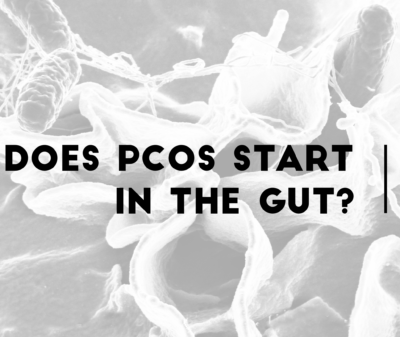What if I told you that in order to treat your ovaries and to improve your menstrual cycle, we need to treat your gut? You may think I am crazy at the moment, but this study reinforces what I see in my practice on the daily. It suggests that the answer to managing and potentially treating PCOS may be in your gut.
Current research suggests that the billions of bacteria in our gut, collectively called the gut microbiome, have a significant effect on our health. These little bugs can control our immune system, our digestion, our hormones and our brain! Amazing, right?
As we come to learn more about polycystic ovarian syndrome (PCOS) it has been understood that the syndrome involves more than just a hormonal imbalance. Therefore, the purpose of the study discussed today was to see whether there was a connection between the gut microbiome and PCOS. Specifically, they looked at how leaky gut, and bacterial lipopolysaccharide (LPS) affect inflammation, insulin resistance, fat accumulation, and hyperandrogenism related to PCOS. (Click HERE to see the article)
What is PCOS?
Polycystic ovarian syndrome (PCOS) is a women’s health condition that effects both the reproductive and metabolic systems1.The diagnosis of PCOS varies, even more so as we learn more about this syndrome from the literature. Insulin resistance and inflammation underlay both the lean type, and weight loss resistance types of PCOS2. In order to receive a formal diagnosis of PCOS doctors also look for hyperandrogenism, oligo-ovulation (irregular ovulation) or anovulation (no ovulation), and polycystic ovaries on ultrasound1. Hyperandrogenism can be seen visually with acne and course hair growth on the body (hirsutism), but it may only be seen in the lab work in more subtle cases.
…. we also need a lot of different types of bacteria in order to keep metabolism, immune function and digestive function at its best…..
What did the study find?
The study was designed to look at multiple factors as it assessed the gut and its connection to inflammation and PCOS3. As suggested, there were significantly higher markers of systemic inflammation in PCOS patients, specifically leukocytes and lymphocytes, which are white blood cells of the immune system. Looking specifically at inflammation in the intestines, there was not a difference between the groups (marker was stool calprotectin).
When investigating the health of the intestines, serum DAO (a marker for skin cell damage in the intestines) was higher in PCOS patients compared to the control group. Furthermore, Zonulin (a marker for tight junction function) was also significantly higher in PCOS patients. This relates to the discussion earlier about LPS and leaky gut. When we have leaky gut, AKA intestinal hyperpermeability, LPS which is a bacterial toxin can enter our blood stream and cause inflammation. This inflammation is known as endotoxemia4. Interestingly, this study showed that LPS was not higher in the blood in women with PCOS.
What does that mean?
Well, LPS only comes from specific types of bacteria, so even though you may have systemic inflammation from foreign particles entering your bloodstream and other metabolic causes, the bacteria wearing the LPS coat were not present in high amounts. This is likely because this study also suggested that there was less diversity of the stool microbiome in PCOS patients compared to the control group.
This finding of less diversity is important because other research is suggesting that we need not only low levels of ‘bad bacteria’ but we also need a lot of different types of bacteria in order to keep metabolism, immune function and digestive function at its best. Therefore, increasing the diversity of the gut could be protective in PCOS.
You and Your Gut
Now we know that PCOS may be linked to the fact that there is less diversity within the stool (and therefore gut) microbiome. With that being said, putting an emphasis on healing the gut may be beneficial to improve diversity of microbes and therefore improve symptoms of PCOS.
At the end of the day, eating a wide range of anti-inflammatory foods, and increasing your consumption of fermented foods can be very helpful for both increasing diversity and decreasing inflammation. These include things such as kimchi, sauerkraut, water kefir, kombucha etc.
Remember, PCOS is not just a condition of the ovary and taking a whole body approach to treatment will get you the best results!
References
- Dumesic, D. A. et al. Scientific Statement on the Diagnostic Criteria, Epidemiology, Pathophysiology, and Molecular Genetics of Polycystic Ovary Syndrome. Endocr. Rev. 36, 487–525 (2015).
- Baptiste, C. G., Battista, M.-C., Trottier, A. & Baillargeon, J.-P. Insulin and hyperandrogenism in women with polycystic ovary syndrome. J. Steroid Biochem. Mol. Biol. 122, 42–52 (2010).
- Lindheim, L. et al. Alterations in Gut Microbiome Composition and Barrier Function Are Associated with Reproductive and Metabolic Defects in Women with Polycystic Ovary Syndrome (PCOS): A Pilot Study. PLoS One 12, e0168390 (2017).
- Neves, A. L., Coelho, J., Couto, L., Leite-Moreira, A. & Roncon-Albuquerque, R. Metabolic endotoxemia: a molecular link between obesity and cardiovascular risk. J. Mol. Endocrinol. 51, R51-64 (2013).

